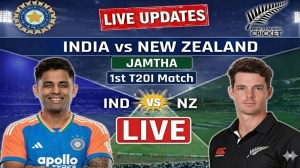Indians and Pakistanis: same difference
Indians and Pakistanis harbour prejudices about each other, while sitting in their respective countries...

Indians and Pakistanis harbour prejudices about each other, while sitting in their respective countries 8212; influenced of course by news channels, textbooks and the speeches of obscurantist leaders. It is interesting, therefore, to see how brief interactions between individuals of both countries lead to the disappearance of animosity, albeit at a personal level.
Recently, I got the opportunity of observing this at the Annual Conflict Transformation workshop organised by
WISCOMP. The workshop, an annual affair, brings together Indians and Pakistanis from various walks of life 8212; academics, journalists, social activists and artists. There are lectures by eminent personalities from India and Pakistan with participants being able to interact with them. Documentaries are also screened.
It took only a few hours for the participants from both sides to admit that while the differences may not have disappeared, a lot of misconceptions have certainly been removed. From the Indian side, participants felt that for a long while the Pakistani was considered an enemy. Pakistanis for their part observed how, in their country, India and Indians could do no right. Such perceptions were so ubiquitous that they had over time become the common sense of the people.
The fundamental differences, on issues like Kashmir, persisted of course, but the similarities were striking. Take the cultural affinities. There was a shared interest in movies, for instance. There were also shared histories. The families of many of the Pakistani participants had migrated from India while there were those in India who had relatives in Pakistan. Interestingly, serving politicians are equally unpopular across the Wagah as they are in India. In fact, one got the feeling that some Pakistani politicians are more popular in India than in Pakistan and vice-versa!
Such interactions may seem just fleeting and insignificant. But when viewed against the broader backdrop of Indo-Pak ties, they are the first step in conflict resolution since they help to remove misconceptions and reduce hatred. While in no way does the feeling of 8216;us and them8217; immediately get transformed into 8216;us8217;, the distance between the two groups does appear to shrink. Such interactions are therefore important and need to be encouraged at different levels and at various fora. The important realisation among ordinary people 8212; that the two countries are not so different after all 8212; goes a long way in establishing the basis for a sustainable peace.
- 01
- 02
- 03
- 04
- 05






























